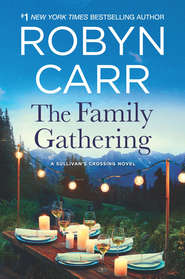По всем вопросам обращайтесь на: info@litportal.ru
(©) 2003-2024.
✖
One Wish
Автор
Год написания книги
2019
Настройки чтения
Размер шрифта
Высота строк
Поля
“Clubbing?” Grace sputtered. “In Thunder Point?”
“Okay, we’ll go up to North Bend. And graze.”
“I’m sure Seth would appreciate that!”
“Well, I won’t take any phone numbers or bring anyone home...”
“Iris,” Grace said, lifting her wineglass. “Let it go. I’ll handle my own love life. In my own time, in my own way.”
“There’s always Troy,” Iris said, sipping.
“Nah, we’re pals. There’s no chemistry.” On his side. “We had a beer together once, followed by grilled cheese and tomato soup. It was swell. Besides, I’m not interested in your sloppy seconds. I read, you know. Rebound boyfriends are not a good idea.”
“You can’t just work all the time,” Iris said.
“No?” Grace asked. “I thought you could.”
* * *
Growing up, everyone thought Grace was a spoiled rich kid, but she had been raised on hard, committed, constant work. If she took a day off she felt ashamed. Her program would suffer. But her work hadn’t been the kind average people understood.
Her full name was Isabella Grace Dillon Banks. She’d given up most of her name and went by Grace Dillon because Izzy Banks was very well-known in some circles. Probably not among her Thunder Point acquaintances, but for those who watched champion figure skating competitions around the world, Izzy Banks was known, both for her skating and for her involvement in dramas and scandals that rocked the skating world.
Grace’s mother, Winnie Dillon Banks, was a wealthy heiress whose grandfather made money in tobacco. She was a well-known skater in her time, though never as successful as Grace in competitions. Winnie’s best show as a competitive skater had been second place in Nationals. But she saw in her daughter her chance to win and became the ultimate stage mother.
Grace had a privileged, isolated childhood where skating was everything.
Grace was born to an ice-skating icon and her coach. Winnie Dillon began a love affair with her coach, Leon Banks, when she was twenty-two. Some cynical rivals and professional observers suggested she succumbed to marriage and motherhood when all signals pointed to her competing days being over.
Winnie and Leon had their daughter on skates before she was four years old. They pushed and trained her hard. In those early days, when skating was simply fun, when she yearned to be the best, Grace was happy. She begged to skate and hated her time off. She’d have been on the ice eight hours a day if her father had let her. She was coddled and loved and indulged. She had a few friends, other little girls who were training and taking lessons and part of a skating club, some of them Leon’s other students.
Grace loved her parents very much and didn’t quite understand until after her father’s death that theirs had been a difficult marriage. Her father was much older than Winnie and more focused on his students than his wife. Her mother was a demanding diva and socialite; she dragged a reluctant Leon to charity events and parties. Her parents disagreed on almost everything, especially Grace’s training and education. Grace never went to traditional school, public or private—she had tutors. Leon thought this might be a mistake, feared she wouldn’t be a well-adjusted child.
At the age of twelve the level of competition turned serious. But Grace was winning everything in her age category and was quickly viewed as unbeatable. She trained on the ice several hours a day, took gymnastics, ballet and practiced yoga. The family moved from Atlanta to Chicago and finally settled in San Francisco, following the best opportunities for her training and education, as well as for Leon’s coaching prospects. Her father was diagnosed with pancreatic cancer when Grace was fourteen. Winnie sought a tougher, stronger, more famous coach the moment Leon fell ill. It was almost as if she’d chosen Mikhail before he was needed. Then Leon passed away rather swiftly, within months of his diagnosis.
Winnie and Grace took a few days off, then it was back on the ice. “Your success meant everything to your father,” Winnie kept saying. It was true that Leon wanted the best for his daughter, but it was Winnie to whom winning was everything. No matter the personal cost. And skating became less for fun and more for life. Winnie blew a gasket whenever Grace didn’t take first place.
Grace left the world of competitive skating when she was twenty-three, right after the Vancouver Games. She went to Portland to stay with a sweet older couple who had once worked for her mother. Ross and Mamie Jenkins had known Grace since birth. They’d been part of Winnie’s staff, Ross a driver and Mamie in housekeeping. They had retired to open a flower shop a few years before Grace quit the circuit. When she needed them, they took her in.
She collapsed. She was exhausted and depressed and afraid of the future. Mamie pampered her and gave her time; it seemed as if she’d slept for a month. Then one evening Mamie spoke up. “If you lay around one more day, you won’t be able to walk. You have to do something—it’s your choice. Get a job, go to school, something.”
Grace didn’t want to be around people and she didn’t believe she had any marketable skills. So she started helping in the flower shop, in the back, learning to make beautiful bouquets and arrangements. Portland was a funky, interesting, welcoming city—not too big, not too small, not uppity or flashy. Little by little, Grace came out of the back room to deal with customers, sometimes delivering flowers, even helping Mamie and Ross with weddings. No one made a fuss over her or asked her a lot of questions.
Every time a major skating competition was covered by the mainstream or sports networks, Grace was glued to the TV, watching every move. And invariably there’d be some short vignette about Izzy Banks, the girl who had it all and threw it all away. “Izzy Banks, the brat on the ice, the fiercest competitor in figure skating, obviously couldn’t take the pressure,” one sportscaster noted of her.
Brat. Boy, that stung.
Her mother would usually get in touch, proving that Winnie couldn’t ignore the competitions any more than Grace could. She’d pressure Grace to return home, return to skating, and the few conversations they had would end in a fight and they wouldn’t speak again for months.
A year before the 2014 Winter Games in Russia, when the dramatic story of her life might be publicly examined yet again, Grace went in search of a new place to settle and tackle life on her own. A little money had been set aside for her by her father and she found Pretty Petals, the shop Iris’s mother had owned. She’d been in Thunder Point almost a year when the winter competition took place. When Grace couldn’t watch it, she’d record it. There had been the usual newsy dish about the more stunning events of the life of Izzy Banks, but no one seemed to recognize Grace. There were, thankfully, more interesting sports scandals that year. And Thunder Point was more a football than figure skating town.
All she’d ever wanted was a life she could control. A life that didn’t include backbreaking labor, cruel rivals, endless travel across too many time zones, the occasional crazed fan or terrible loneliness. She wanted to know what it felt like to have real friends, not a staff of coaches, therapists, a security detail and competitors. She’d never had a boyfriend.
She did, however, have more than one gold medal. She’d won every significant competition in the world.
* * *
It drizzled in the days following Christmas, typical Oregon Coast weather in winter. Grace’s only part-time employee, a local married woman with a child in elementary school, came into the shop to resign. The woman’s life had grown too busy and complex, she complained. Grace knew it was going to create a challenge, even though all the woman had done was manage the front of the store. Grace was going to be back to doing it all, just as she had when the shop was new. She’d had the doorbell installed so she could lock the front door and go upstairs. The doorbell would buzz in her loft. And she could always close the shop to make deliveries when necessary. She’d ask around for a delivery boy.
Business was typically down the week following a holiday and the days were much shorter so Grace closed the shop at four one afternoon and drove out to Cooper’s for a beer. She wasn’t surprised to see Troy was back from visiting his family in Morro Bay. She was also not surprised that there was no one around the bar. People didn’t hang out on the beach in cold, wet weather like this. But she had to admit surprise at seeing a big pile of books and papers beside his laptop on the bar next to his cup of coffee. She jumped on a bar stool. “Welcome home. Did you have fun with the family?” she asked.
“More or less. My sister has three little undisciplined kids and I slept on her couch. It was brutal. What can I get you?”
“Beer?”
“Was that a question or order?” he asked.
“Beer, please.” She glanced at the books. “Homework?”
“Lesson plans,” he said, closing everything up, stacking it all and pushing it to one side. “We’re caught up in a couple of my classes so we’re going to have some fun. I’m going to offer them a chance for extra credit if they research the history of something that interests them—like a rock band or in-line skating or maybe a sport like kayaking. I’m writing up a few examples.”
“That almost sounds fun, but not enough fun. Did you get in any skiing over the holiday?”
“Nope,” he said, drawing her a draft. “We played some golf, but the weather wasn’t great. I might make a drive up to Mount Hood before I get back to work, maybe for a day. If I had more time and money I’d check out Tahoe. So, you were the maid of honor.”
“I was. Kind of short notice.”
“I heard it wasn’t exactly planned in advance...”
“That’s how I heard it, too. Iris said they decided and just did it. They got a marriage license, called a judge Seth knew, told Seth’s family and got it done. I didn’t even have time to order special flowers.” She sipped a little of her beer. “How are you handling it?”
“Fine,” he said.
“Good. That’s good.”
He leaned both hands on the bar. “I went out with my little brother and got roaring drunk. Then I bought a Jeep I can’t really afford.”
“Oh,” she said. “Gosh, I hope you don’t get your heart broken too often or you’ll go broke.”
“I’d wanted that Jeep anyway. And I deserved a good drunk.”
“Is that what caused...” She reached out toward the remnants of what looked like a healing bruise on his forehead.
He ducked away from her fingers. “I forgot I was sleeping on the couch, fell off and hit the coffee table.”
She couldn’t help herself. She laughed.
“And my heart isn’t broken,” he insisted. “Just a little coronary bruise. Gimme a week or two and it’ll be like nothing ever happened.”













